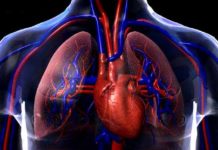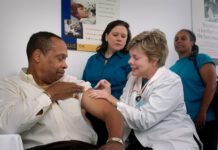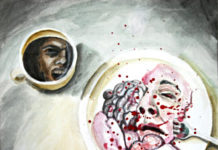Patients on Antipsychotics at High Risk for Cardiovascular Issues, Study Finds
Antipsychotics present a known risk for major side effects. A new study suggests that certain antipsychotics may present a greater risk for cardiovascular disease than others.
More Children Receiving ‘Off-Label’ Antipsychotics for ‘ADHD’
Over the past twenty years, the number of prescriptions for atypical antipsychotics written to children and young adults between four and eighteen has increased...
New Research Documents Widening Mortality Gap for Bipolar and Schizophrenia
Analysis of longitudinal data from 2000-2014 demonstrate mortality gap is widening between persons with a diagnosis of bipolar or schizophrenia compared to the general population
Psychosis Diagnosis Linked With Lower Rates of Exercise
A new study finds that for those experiencing symptoms associated with psychosis, a low-level of physical activity is associated with receiving a diagnosis of a psychotic disorder.
Mental Health Nurses Do Not Routinely Assess for Effects of Antipsychotic Medications
Researchers believe that side-effect monitoring is critical because of the increase in the use of antipsychotics
We Need Ecstasy and Cocaine in Place of Prozac and Xanax
From Aeon: While psychiatric drugs are often ineffective and can have serious side effects, there are many psychedelics and other illicit substances that have proven...
The MD and the Imaginary Eating Disorder
He could have asked me if there was a specific event that had precipitated my suicide attempt. He could have asked if I had a history of trauma. He could have simply asked, “What happened?” “What are you feeling?” or “So what’s going on?” Nope. He chose to open our meeting with an accusatory remark about a make-believe eating disorder.
Landmark Schizophrenia Study Recommends More Therapy
Results of a large government-funded study call into question current drug heavy approaches to treating people diagnosed with schizophrenia. The study, which the New York Times called “by far the most rigorous trial to date conducted in the United States,” found that patients who received smaller doses of antipsychotic drugs with individual talk therapy, family training, and support for employment and education had a greater reduction in symptoms as well as increases in quality of life, and participation in work and school than those receiving the current standard of care.
Study Identifies Cause of Weight Gain From Antipsychotic Drugs
From UPI: A team of researchers from the University of Texas Southwestern Medical Center found that the serotonin 2c receptor is responsible for weight gain...
Researchers Probe Connections Between Physical Activity and ‘Severe Mental Illness’
How does physical activity affect people diagnosed with bipolar, schizophrenia and major depressive disorders?
More Evidence That Physical Activity Prevents Depression
Higher levels of physical activity serve as a protective factor for the future development of depression.
The Recovery After an Initial Schizophrenia Episode (RAISE) Study: Notes from the Trenches
I was a psychiatrist who participated in the Recovery After an Initial Schizophrenia Episode Early Treatment Program (RAISE ETP). Although I welcomed the positive headlines that heralded the study's results, the reports left me with mixed feelings. What happened to render the notion that talking to people about their experiences and helping them find jobs or go back to school is something novel?
Experts Decry Dangerous Use of Antipsychotics in Children
In a featured article for Psychiatric Services, psychiatrists from Dartmouth raise the alarm on the increasing numbers of children prescribed dangerous antipsychotic drugs. Despite the fact that data on the safety of long-term use of these drugs in this vulnerable population “do not exist,” the rate of children and adolescents being prescribed antipsychotic drugs have continued to increase over the past fifteen years.
We Need to Talk About Frankie
In this piece for The Cut, Dyan Neary details the story of Frankie Perry, a man whose life was forever altered by being prescribed an...
Popular Drug Reveals the Issue of “Off-Label” Use
From The Washington Post: Despite major lawsuits and detailed reports pertaining to severe health risks associated with the antipsychotic Seroquel, the drug remains one of...
Review Links Antipsychotics with Risk for Heart Attacks
A systematic review published this week in the British Journal of Clinical Pharmacology found that patients taking antipsychotic drugs were at nearly twice the risk...
Researchers Test Harms and Benefits of Long Term Antipsychotic Use
Researchers from the City College of New York and Columbia University published a study this month testing the hypothesis that people diagnosed with schizophrenia treated long-term with antipsychotic drugs have worse outcomes than patients with no exposure to these drugs. They concluded that there is not a sufficient evidence base for the standard practice of long-term use of antipsychotic medications.
Large Study Confirms Elevated Risk of Diabetes When Prescribed Antipsychotics
A large longitudinal study finds once more that being prescribed antipsychotics significantly increases the risk of diabetes.
Many Foster Kids Are Still Being Prescribed Antipsychotic Drugs
Many experts expressed concern when the rate of antipsychotic prescriptions to children in foster care showed a rapid increase, peaking in 2008, and new recommendations and policies have tried to curb the use of these drugs. While the rate has plateaued, a new study points out that the “new normal” prescription levels are still dangerously high. The data reveals that almost one in ten children in foster care are currently being prescribed antipsychotic drugs with dangerous side-effects, many for diagnoses like ‘ADHD’ and disruptive behavior.
Call to Monitor Adverse Effects of Antipsychotics in Youth
Researchers point to the risks of using antipsychotics with youth and caution against the practice.
Study Reduces Over-prescription of Antipsychotics in Older Adults
New intervention shows promise in reducing over-prescription of off-label antipsychotics in older adults.
Researchers Search for Subgroups Where Antidepressants Are More Effective
The researchers theorized that this increased effectiveness was due not to “antidepressant” properties, but rather to the drug’s side effects, which include insomnia, drowsiness, and nausea.
SCOTUS Declines Risperdal Appeal, J&J to Pay $124 M
On Monday, the US Supreme Court declined to hear Johnson and Johnson’s final appeal, forcing the company to pay $124 million for the deceptive marketing of the antipsychotic Risperdal. In 2011, South Carolina ordered the company to pay $327 million for pursuing “profits-at-all-costs” in its efforts to persuade doctors to prescribe their drug, but the fine was lowered to $136 million last year. The company had hoped to argue that the remaining penalties constituted an “excessive fine” and was supported by PhRMA, the Washington Legal Foundation, the Cato Institute and the Chamber of Commerce.
Is Increasing Antidepressant Use Contributing to the Obesity Epidemic?
Since the 1980s, antidepressant use has risen by at least four-hundred percent and obesity rates have climbed to include thirty percent of the population....
A Mental Patient’s View of the Body
In 20 years of inpatient hospitalization, the psychiatrists that I encountered focused almost exclusively on treating my diseased mind and had no concept or interest in the body. While the wheels of “progress” turn slowly in mental health, I hope that along with ongoing advocacy there will be a focus on responsible health counseling and supporting people in healthier eating and living.

























